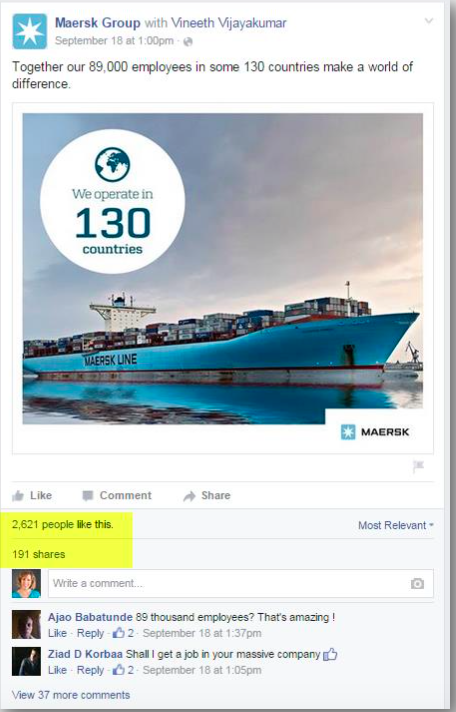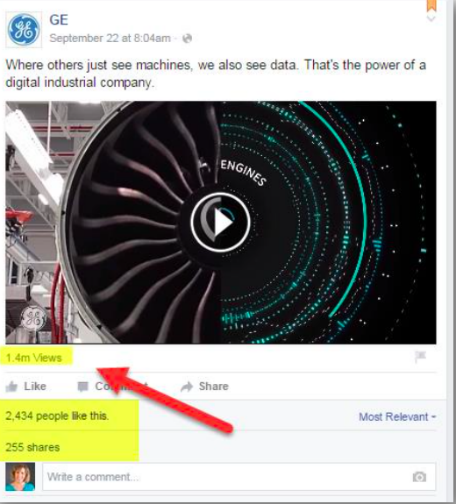
Time and time again, B2B marketers have heard, “Facebook doesn’t work for B2B”. That statement could not be further from the truth. What B2B marketers should ask themselves is; am I truly engaging my Facebook audience by sharing things they want to see and interact with?
Facebook can be an incredibly powerful tool, if used correctly. In fact SteamFeed found that 60% of all social media traffic to B2B websites comes from Facebook, Twitter and LinkedIn. So, there is proof that Facebook for B2B marketers works, but now it’s time to figure out how to create better engagement and make more meaningful connections.
Last week at MarketingProfs B2B Marketing Forum, Andrea Vahl took the stage and shared some fantastic insights into how B2B brands can improve visibility, track leads and improve Facebook Ad targeting. Below are some of her best insights.
Is Organic Reach Dead?
While organic reach is not completely gone, it is on the decline. Additionally, your reach and interactions are out there for the entire world to see. So, when something is performing badly, everyone knows.
Before you eliminate Facebook from your strategy, know that B2B marketers can still get organic reach. Andrea ran some experiments by posting a similar message on Facebook, Twitter and LinkedIn. What she found was that the messages on Facebook had a much longer shelf life than those on Twitter and LinkedIn.
What Does Work For Brands?
There is no denying that cats, dogs and babies rule Facebook. People love to be entertained by dogs falling down stairs and feel a connection with a heart-warming image. As a B2B brand, you can post a video of a dog falling down the stairs, as long as your message allows you to relate the content to your audience in some way.
Along with humor and entertainment, eye-catching images work really well for brands. Below is an example that Andrea shared of a B2B company grabbing the attention of their audience with bold images and succinct messages.

Image via Andrea Vahl
Native Facebook videos can also be very powerful. If you have a video, you need to be uploading it directly to Facebook to get more views, reach and engagement. YouTube typically doesn’t get the reach and exposure of native Facebook videos. Also, the ideal length for a video is 30 seconds, keep it under two minutes. You’ll see a drop off in the length that people complete for. General Electric is an example of a company that uploads some unique videos that are entertaining and bring people in.

Image via Andrea Vahl
Remember that you can also include a call-to-action at the end of your video to drive your audience directly to your website.
Tools for Facebook Marketing
There were a few different tools that Andrea recommended for creating visuals and producing quality videos to share with your Facebook audience. These include:
Visual Tools
Video Resources
3 Recommendations for Facebook Advertising
#1 – Transfer Fans to Your Email List
Don’t build your company on the rented castle that is Facebook. Move them to your email list so that you can continue to nurture the relationship on a more 1:1 basis off of Facebook.
#2 – Plan on Ad Spend
Facebook has very much become a pay-to-play model that does require some sort of investment. Within Facebook, you can use highly targeted ads to convert your target audience. Where you should spend your focus (and funds) is on email conversions, website clicks and website conversions that only target your warm leads (those that have already liked your page).
#3 – Measure What Matters
Beyond reach and engagement, you’re going to want to measure the actual number of conversions from Facebook. In order to do that, you’re going to need to put a Facebook conversion pixel on your website. That way, you can see which ad sent that conversion to your website.
In order to utilize the conversion pixel, you must have:
- A website where you can install the conversion pixel
- A thank you page that indicates the desired action is completed
Facebook is still flush with opportunities for B2B marketers, but it may require that current strategies be adapted to meet the needs of the audience. What tactics on Facebook have worked best for your organization, or what are some great examples that you’ve seen out in the wild?


